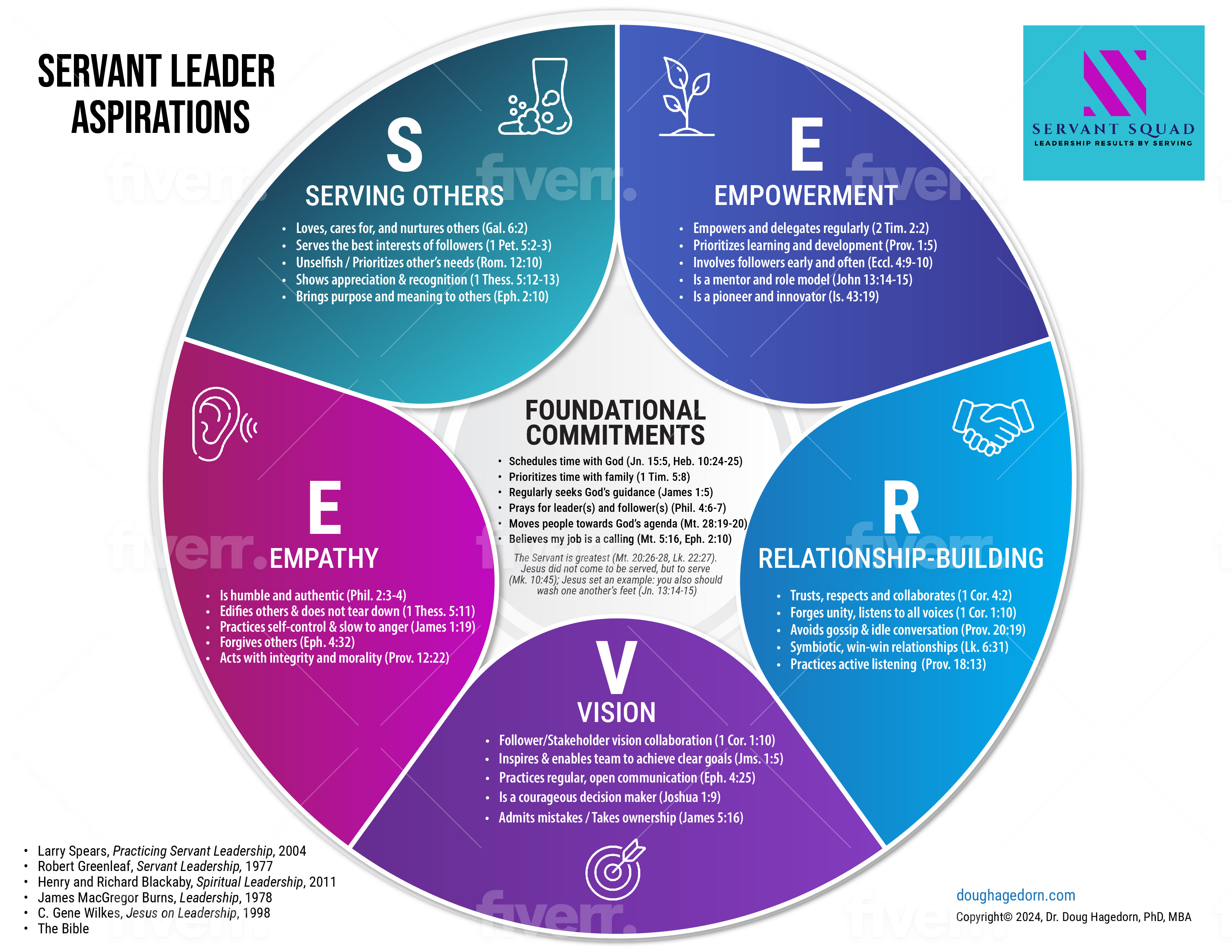Embracing servant leadership
 adobe stock
adobe stock
 ChatGPT
ChatGPTAmong the potpourri of leadership philosophies, servant leadership distinguishes itself because it is rooted in the idea of putting others first. If we are honest with ourselves, this is not naturally ingrained in most of us, but the research highlights many benefits and advantages for leader, follower and organizations. Servant leaders build strong relationships, empower their teams, promote a shared vision, and cultivate empathy within their organizations.
The Christian leader has the challenge to model themselves after Jesus and to "give our life away" or "lose our life" (Matt. 10:39, Luke 6:38, 2 Cor. 5:15). We are called to act as Christ's representative or ambassador (2 Cor. 5:20, Eph. 6:20, Colossians 3:17). Our leadership style should portray an eternal mindset (2 Cor. 4:18, Col. 3:1-2, 1 John 2:15-17) that selflessly endeavors to primarily serve and share God's love.
Let's delve into the essence of servant leadershipthrough the acrostic: Serve, Empower, Relationship Building, Vision, and Empathy (see the graphic below).
Serve: At the core of servant leadership lies the fundamental principle of service. Leaders prioritize the needs of their team members above their own, aiming to uplift and support them in achieving their goals. By adopting a mindset of service, leaders foster an environment of trust and collaboration, where individuals feel valued and motivated to contribute their best.
Empower:Servant leaders understand the importance of empowering their team members. They delegate authority, provide resources, and offer guidance, allowing individuals to take ownership of their work and grow professionally. Empowerment not only enhances productivity but also cultivates a sense of autonomy and self-confidence among team members, leading to greater innovation and success.
Relationship Building: Effective leadership hinges on meaningful relationships. Servant leaders prioritize building strong connections with their team members based on trust, respect, and understanding. They invest time in getting to know their employees, actively listen to their concerns, and offer support when needed. These genuine relationships form the foundation of a cohesive and high-performing team.
Vision: A compelling vision serves as a guiding light for servant leaders. They articulate a clear and inspiring vision that aligns with the organization's values and goals. By communicating this vision effectively, leaders motivate their team members to work towards a shared purpose, fostering a sense of unity and direction. Visionary leadership ignites passion and drives meaningful change within the organization.
Empathy:Empathy lies at the heart of servant leadership. Leaders empathize with the experiences and emotions of their team members, demonstrating understanding and compassion in their interactions. By putting themselves in others' shoes, leaders can better address individual needs, resolve conflicts, and foster a supportive work environment. Empathetic leadership fosters a culture of inclusivity and belonging, where every voice is heard and valued.

In conclusion, servant leadership offers a powerful framework for driving organizational success through service, empowerment, relationship building, vision, and empathy. By embracing these principles, leaders can inspire their teams to reach new heights of performance and fulfillment, creating a positive impact that extends far beyond the confines of the workplace.
How can we practically make it more about THEM? A servant leader must start with himself or herself:
- Schedule time with God (John 15:5, Heb. 10:24-25)
- Prioritize time with family (1 Tim. 5:8)
- Regularly seek God's guidance (James 1:5)
- Pray for leader(s) and follower(s) (Phil. 4:6-7)
- Move people toward God's agenda (Matt. 28:19-20)
- Believe job/vocation is a calling (Matt. 5:16, Eph. 2:10)
Jesus did not come to be served, but to serve (Mark 10:45); He set an example by washing his followers' feet (John 13:14-15); A leader is not the greatest. A servant is the greatest (Matt. 20:26-28, Luke 22:27).
Dr. Hagedorn is a seasoned Fortune 500 executive, professor, author, and leadership consultant. With a PhD in Leadership Studies from Dallas Baptist University and an MBA from the University of Dallas, he's authored three books, including "A Lasting Legacy" alongside a nationwide radio, columnist, and podcast presence. Doug's expertise extends to founding a private K-12 school, launching two businesses, and creating an online course on finding and fulfilling your why- creating meaning, purpose and legacy in life. Outside work, Doug cherishes family time, reading, and sports. Learn More » |
More on Productivity and Time Management
- Business growth barriers: the real reason your business isn’t growing (by Christian Muntean)
- Seven signs you don't value your time (by Carey Nieuwhof)
- 3 practices for planning for tomorrow without worrying about tomorrow (by Jordan Raynor)
- Stop chasing growth: how business stabilization can triple your value (by Christian Muntean)


